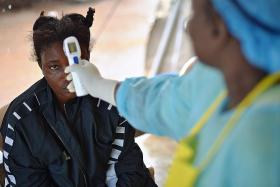Ebola could potentially infect 1.4 million people by next year
The worst-case scenario: Ebola infections could skyrocket to as high as 1.4 million in Liberia and Sierra Leone by next January.
The US Centers of Disease Control and Prevention (CDC) estimated that Ebola cases in these two West African nations could range between 550,000 and 1.4 million cases by January 20, 2015.
So far, the deadly epidemic has infected 5,864 people.
It has claimed 2,811 lives since the beginning of the year in Sierra Leone, Guinea, Liberia and Nigeria, the World Health Organization said.
Data no up to date but still useful
However, some experts have warned that these figures are based on data that is three weeks old. Since then, the United States and other nations have stepped in their response toward the crisis.
"The numbers do not reflect current condition," said a CDC statement.
Still, the agency's chief Tom Frieden said government leaders and international relief groups can use the data to model what may happen under different conditions and variables.
“The bottom line here – and what I think what is really important in this tool – is that the model shows that a surge now can break the back of the epidemic,” Frieden said.
“It also shows that there are severe costs of delay.”

Numbers will surge?
The UN health agency earlier Tuesday projected that new cases would increase from hundreds each week to thousands without “drastic improvements in control measures.”
Infections could more than triple to 20,000 by November.
Ebola is spread through close contact with the bodily fluids of an infected person, or by touching the corpse of someone who died from the disease – as is a common custom in funeral rites.
The hemorrhagic fever causes muscle aches, diarrhea and vomiting.
“If we move fast enough we can turn it around,” said Frieden. “I am confident that the most dire projections are not going to come to pass.”
Source: AFP
Get The New Paper on your phone with the free TNP app. Download from the Apple App Store or Google Play Store now


